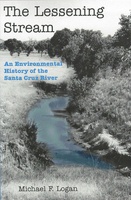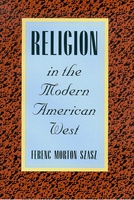Arizona's War Town
Few American towns went untouched by World War II, even those in remote corners of the country. During that era, the federal government forever changed the lives of many northern Arizona citizens with the construction of the U.S. Army ordnance depot at Bellemont, ten miles west of Flagstaff. John Westerlund now tells how this ...
The Lessening Stream
Newcomers to Tucson know the Santa Cruz River as a dry bed that can become a rampaging flood after heavy rains. Yet until the late nineteenth century, the Santa Cruz was an active watercourse that served the region's agricultural needsuntil a burgeoning industrial society began to tap the river's underground flow.
The Lessening Stream reviews the changing human use of the Santa Cruz River and its aquifer from the earliest human presence in the valley to today. Michael Logan examines the social, cultural, and political history of the Santa Cruz Valley while interpreting the implications of various cultures' impacts on the river and speculating about the future of water in the region.
Logan traces river history through three erasarchaic, modern, and postmodernto capture the human history of the river from early Native American farmers through Spanish missionaries to Anglo settlers. He shows how humans first diverted its surface flow, then learned to pump its aquifer, and today fail to fully understand the river's place in the urban environment.
By telling the story of the meandering riverfrom its origin in southern Arizona through Mexico and the Tucson Basin to its terminus in farmland near PhoenixLogan links developments throughout the river valley so that a more complete picture of the river's history emerges. He also contemplates the future of the Santa Cruz by confronting the serious problems posed by groundwater pumping in Tucson and addressing the effects of the Central Arizona Project on the river valley.
Skillfully interweaving history with hydrology, geology, archaeology, and anthropology, The Lessening Stream makes an important contribution to the environmental history of southern Arizona. It reminds us that, because water will always be the focus for human activity in the desert, we desperately need a more complete understanding of its place in our lives.
Religion in the Modern American West
When Americans migrated west, they carried with them not only their hopes for better lives but their religious traditions as well. Yet the importance of religion in the forging of a western identity has seldom been examined. In this first historical overview of religion in the modern American West, Ferenc Szasz shows the important role that organized religion played in the shaping of the region from the late-nineteenth to late-twentieth century. He traces the major faiths over that time span, analyzes the distinctive response of western religious institutions to national events, and shows how western cities became homes to a variety of organized faiths that cast only faint shadows back east. While many historians have minimized the importance of religion for the region, Szasz maintains that it lies at the very heart of the western experience. From the 1890s to the 1920s, churches and synagogues created institutions such as schools and hospitals that shaped their local communities; during the Great Depression, the Latter-day Saints introduced their innovative social welfare system; and in later years, Pentecostal groups carried their traditions to the Pacific coast and Southern Baptists (among others) set out in earnest to evangelize the Far West. Beginning in the 1960s, the arrival of Asian faiths, the revitalization of evangelical Protestantism, the ferment of post-Vatican II Catholicism, the rediscovery of Native American spirituality, and the emergence of New Age sects combined to make western cities such as Los Angeles and San Francisco among the most religiously pluralistic in the world. Examining the careers of key figures in western religion, from Rabbi William Friedman to Reverend Robert H. Schuller, Szasz balances specific and general trends to weave the story of religion into a wider social and cultural context. Religion in the Modern American West calls attention to an often overlooked facet of regional history and broadens our understanding of the American experience.



